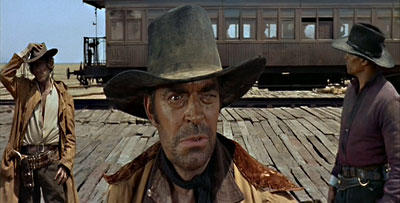Wednesday, September 28, 2005:

Leadbelly -- Rock Island Line
Lonnie Donegan -- Rock Island Line
"Rock Island Line" is a traditional song with an arrangement made famous by Leadbelly. It's been covered by a number of big names including Johnny Cash and Carl Perkins, but I think the versions I'm most interested in are the ones by Leadbelly and Lonnie Donegan. Leadbelly's is a cappella with somewhat angular group harmonies the Golden Gate Jubilee Quartet; the vocals chug along, in no hurry, alternating leads stepping up for a bit, then stepping back to support. The Golden Gate Jubilee Quartet are mostly known for carefully rehearsed, refined harmonies; Leadbelly was more known for a sort of raw, spontaneuos enthusiasm. Here the Quartet seems to force him to square his shoulders and tighten his tie; the results dial his intensity back a bit from 11 but the results are still impressive.
What the song's about, though, is something else entirely. Legend has it that Leadbelly heard a prisoner singing it and adopted it as his own, rearranging the song (and, I'm betting, also the lyrics). The song seems to be about Christianity, about Moses, about hiding, about a comfortable train, and about leaving a woman. The melody's nice but I can't make heads or tails of the words; the song's either heavily metaphorical or I'm a bit dense. Maybe the meaning has been lost over the generations--what ties it all together? Anything?
Donegan's version is based on Leadbelly's, but with a few judicial additions and excisions the lyrics have come clear. The story's about a train conductor who lies about what he's carrying so he can go through without paying a toll. In Donegan's version the instrumentation is different as well: the group added bass and acoustic guitar, upped the tempo, and made the melody a bit more dynamic.
Donegan's version was a surprise hit in England in the mid-1950s, selling a metric tonne of copies and almost single-handedly starting a skiffle craze, stirring up dreams of fame in four young men from Liverpool.
[Amazon.com]: Leadbelly -- Take This Hammer (When the Sun Goes Down v. 5)
[Amazon.com]: Lonnie Donegan -- Rock Island Line (or, if you prefer, volume 3 of the Hard to Find 45s on CD series)
Leadbelly and Lonnie Donnegan: Rock Island Line

Leadbelly -- Rock Island Line
Lonnie Donegan -- Rock Island Line
"Rock Island Line" is a traditional song with an arrangement made famous by Leadbelly. It's been covered by a number of big names including Johnny Cash and Carl Perkins, but I think the versions I'm most interested in are the ones by Leadbelly and Lonnie Donegan. Leadbelly's is a cappella with somewhat angular group harmonies the Golden Gate Jubilee Quartet; the vocals chug along, in no hurry, alternating leads stepping up for a bit, then stepping back to support. The Golden Gate Jubilee Quartet are mostly known for carefully rehearsed, refined harmonies; Leadbelly was more known for a sort of raw, spontaneuos enthusiasm. Here the Quartet seems to force him to square his shoulders and tighten his tie; the results dial his intensity back a bit from 11 but the results are still impressive.
What the song's about, though, is something else entirely. Legend has it that Leadbelly heard a prisoner singing it and adopted it as his own, rearranging the song (and, I'm betting, also the lyrics). The song seems to be about Christianity, about Moses, about hiding, about a comfortable train, and about leaving a woman. The melody's nice but I can't make heads or tails of the words; the song's either heavily metaphorical or I'm a bit dense. Maybe the meaning has been lost over the generations--what ties it all together? Anything?
Donegan's version is based on Leadbelly's, but with a few judicial additions and excisions the lyrics have come clear. The story's about a train conductor who lies about what he's carrying so he can go through without paying a toll. In Donegan's version the instrumentation is different as well: the group added bass and acoustic guitar, upped the tempo, and made the melody a bit more dynamic.
Donegan's version was a surprise hit in England in the mid-1950s, selling a metric tonne of copies and almost single-handedly starting a skiffle craze, stirring up dreams of fame in four young men from Liverpool.
[Amazon.com]: Leadbelly -- Take This Hammer (When the Sun Goes Down v. 5)
[Amazon.com]: Lonnie Donegan -- Rock Island Line (or, if you prefer, volume 3 of the Hard to Find 45s on CD series)